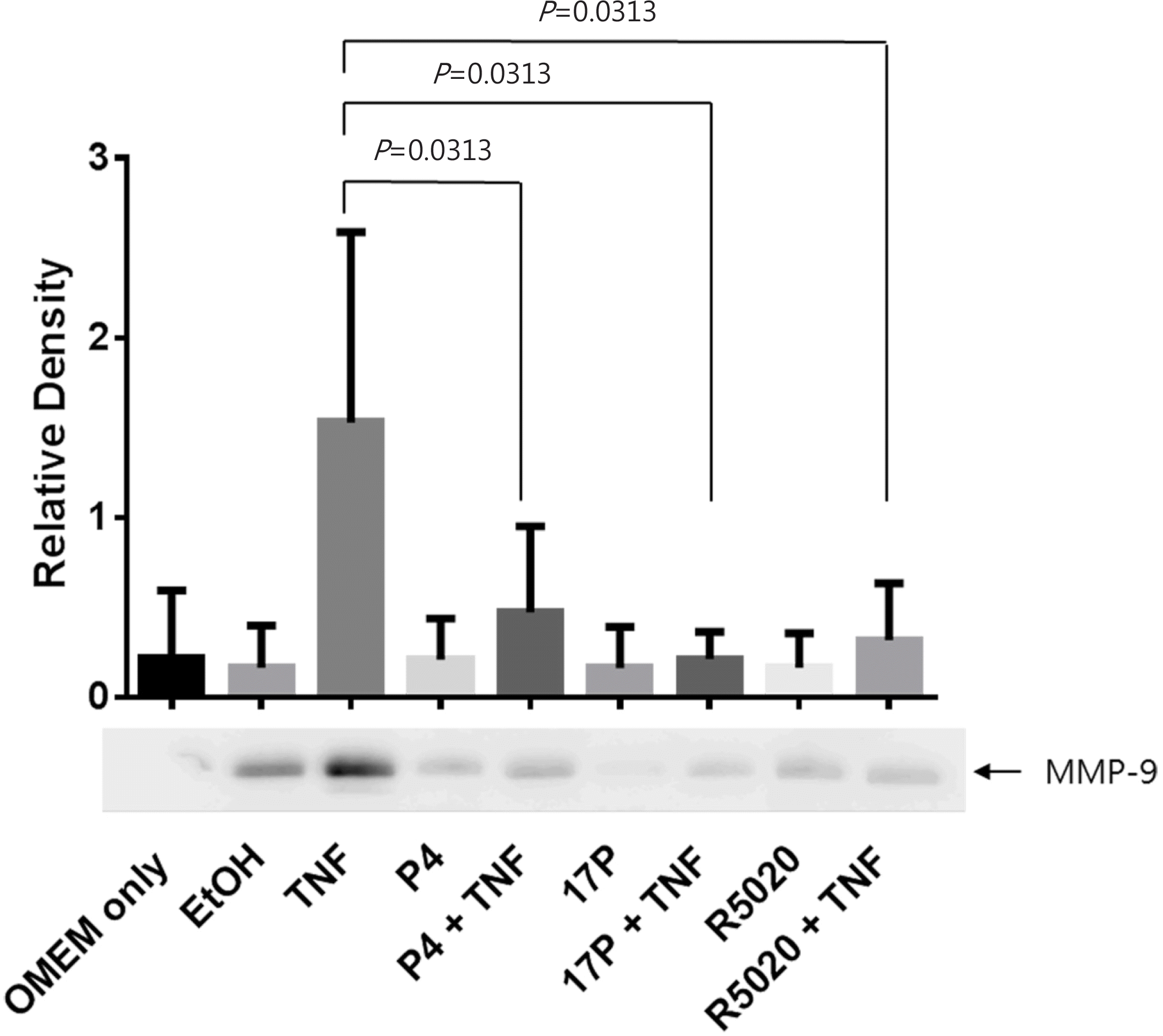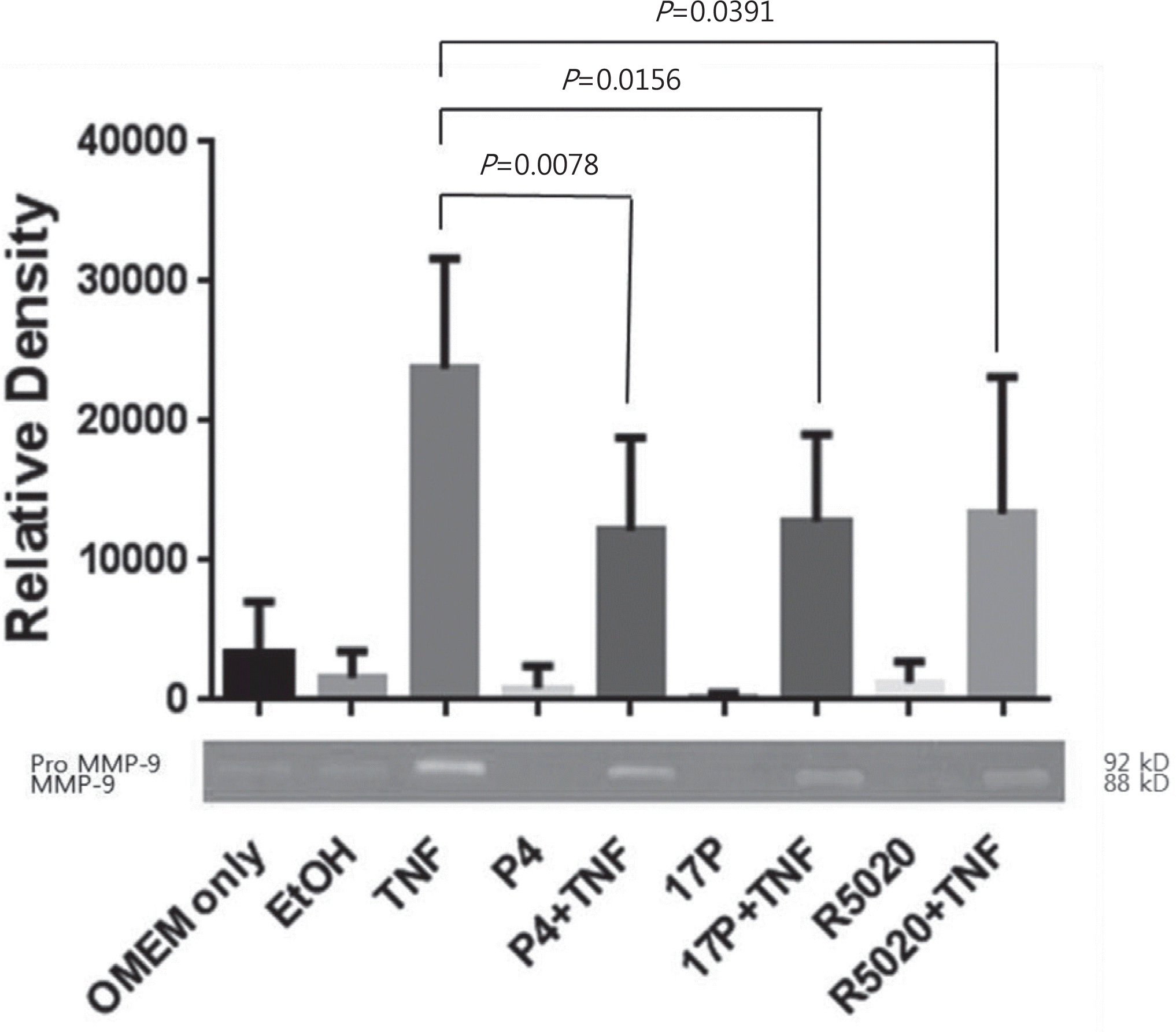Abstract
Objective
Progesterone is used to prevent recurrent preterm delivery, however the molecular mechanisms of its effect are incompletely understood. The objective of this study was to determine the effect of progesterone on tumor necrosis factor (TNF)-α-induced matrix metalloproteinase (MMP)-9 activity in human choriodecidual (CD) membranes.
Methods
We collected CD membranes from women with uncomplicated term pregnancies who were scheduled for elective cesarean delivery (n=10). CD membranes (1×1 cm) were incubated in tissue culture media at 37°C. We pretreated the CD membranes with progesterone (P4), 17α-hydroxyprogesterone caproate (17P), promegestone (R5020), or vehicle (ethanol) for 24 hours. The CD membranes were subsequently treated with TNF-α (with continued progesterone treatment) for 48 hours, then media was harvested for measuring MMP-9 activity by zymography and total protein was isolated from CD membrane tissues for MMP-9 expression by western blot analysis.
Go to : 
REFERENCES
1). Beck S., Wojdyla D., Say L., Betran AP., Merialdi M., Requejo JH, et al. The worldwide incidence of preterm birth: a systematic review of maternal mortality and morbidity. Bull World Health Organ. 2010. 88:31–8.

2). Martin JA., Hamilton BE., Sutton PD., Ventura SJ., Mathews TJ., Kirmeyer S, et al. Births: final data for 2007. Natl Vital Stat Rep. 2010. 58:1–85.
3). Maymon E., Ghezzi F., Edwin SS., Mazor M., Yoon BH., Gomez R, et al. The tumor necrosis factor alpha and its soluble receptor profile in term and preterm parturition. Am J Obstet Gynecol. 1999. 181(5 Pt 1):1142–8.
4). Fortunato SJ., Menon R., Lombardi SJ. Role of tumor necrosis factor-alpha in the premature rupture of membranes and preterm labor pathways. Am J Obstet Gynecol. 2002. 187:1159–62.
5). Mackenzie AP., Schatz F., Krikun G., Funai EF., Kadner S., Lockwood CJ. Mechanisms of abruption-induced premature rupture of the fetal membranes: Thrombin enhanced decidual matrix metalloproteinase-3 (stromelysin-1) expression. Am J Obstet Gynecol. 2004. 191:1996–2001.

6). Allen TK., Feng L., Grotegut CA., Murtha AP. Progesterone receptor membrane component 1 as the mediator of the inhibitory effect of progestins on cytokine-induced matrix metalloproteinase 9 activity in vitro. Reprod Sci. 2014. 21:260–8.

7). Hassan SS., Romero R., Vidyadhari D., Fusey S., Baxter JK., Khandelwal M, et al. Vaginal progesterone reduces the rate of preterm birth in women with a sonographic short cervix: a multicenter, randomized, double-blind, placebo-controlled trial. Ultrasound Obstet Gynecol. 2011. 38:18–31.

8). Meis PJ., Klebanoff M., Thom E., Dombrowski MP., Sibai B., Moawad AH, et al. Prevention of recurrent preterm delivery by 17 alpha-hydroxyprogesterone caproate. N Engl J Med. 2003. 348:2379–85.

9). Goldenberg RL., Hauth JC., Andrews WW. Intrauterine infection and preterm delivery. N Engl J Med. 2000. 342:1500–7.

10). Gonçalves LF., Chaiworapongsa T., Romero R. Intrauterine infection and prematurity. Ment Retard Dev Disabil Res Rev. 2002. 8:3–13.

11). Romero R., Espinoza J., Goncalves LF., Kusanovic JP., Friel L., Hassan S. The role of inflammation and infection in preterm birth. Semin Reprod Med. 2007. 25:21–39.

12). Romero R., Espinoza J., Kusanovic JP., Gotsch F., Hassan S., Erez O, et al. The preterm parturition syndrome. BJOG. 2006. 113(Suppl 3):17–42.

13). Holmgren C., Esplin MS., Hamblin S., Molenda M., Simonsen S., Silver R. Evaluation of the use of anti-TNF-alpha in an LPS-induced murine model. J Reprod Immunol. 2008. 78:134–9.
14). Draper D., McGregor J., Hall J., Jones W., Beutz M., Heine RP, et al. Elevated protease activities in human amnion and chorion correlate with preterm premature rupture of membranes. Am J Obstet Gynecol. 1995. 173:1506–12.

15). Parry S., Strauss JF 3rd. Premature rupture of the fetal membranes. N Engl J Med. 1998. 338:663–70.

16). Cockle JV., Gopichandran N., Walker JJ., Levene MI., Orsi NM. Matrix metalloproteinases and their tissue inhibitors in preterm perinatal complications. Reprod Sci. 2007. 14:629–45.

17). Strauss JF 3rd. Extracellular matrix dynamics and fetal membrane rupture. Reprod Sci. 2013. 20:140–53.

18). Goldman S., Weiss A., Eyali V., Shalev E. Differential activity of the gelatinases (matrix metalloproteinases 2 and 9) in the fetal membranes and decidua, associated with labour. Mol Hum Reprod. 2003. 9:367–73.

19). Kumar D., Fung W., Moore RM., Pandey V., Fox J., Stetzer B, et al. Proinflammatory cytokines found in amniotic fluid induce collagen remodeling, apoptosis, and biophysical weakening of cultured human fetal membranes. Biol Reprod. 2006. 74:29–34.
20). McLaren J., Taylor DJ., Bell SC. Increased concentration of pro-matrix metalloproteinase 9 in term fetal membranes overlying the cervix before labor: implications for membrane remodeling and rupture. Am J Obstet Gynecol. 2000. 182:409–16.

21). Sfakianaki AK., Norwitz ER. Mechanisms of progesterone action in inhibiting prematurity. J Matern Fetal Neonatal Med. 2006. 19:763–72.

22). Luo G., Abrahams VM., Tadesse S., Funai EF., Hodgson EJ., Gao J, et al. Progesterone inhibits basal and TNF-alpha-induced apoptosis in fetal membranes: a novel mechanism to explain progesterone-mediated prevention of preterm birth. Reprod Sci. 2010. 17:532–9.
23). Kumar D., Springel E., Moore RM., Mercer BM., Philipson E., Mansour JM, et al. Progesterone inhibits in vitro fetal membrane weakening. Am J Obstet Gynecol. 2015. 213:520. .e1-9.
24). Pineda-Torres M., Flores-Espinosa P., Espejel-Nunez A., Estrada-Gutierrez G., Flores-Pliego A., Maida-Claros R, et al. Evidence of an immunosuppressive effect of progesterone upon in vitro secretion of proinflammatory and prodegradative factors in a model of choriodecidual infection. BJOG. 2015. 122:1798–807.
25). Arechavaleta-Velasco F., Mayon-Gonzalez J., Gonzalez-Jimenez M., Hernandez-Guerrero C., Vadillo-Ortega F. Association of type II apoptosis and 92-kDa type IV collagenase expression in human amniochorion in prematurely ruptured membranes with tumor necrosis factor receptor-1 expression. J Soc Gynecol Investig. 2002. 9:60–7.

Go to : 
 | Fig. 1Effects of progesterone and TNF-α on MMP-9 protein expression in choriodecidual membranes. Choriodecidual membranes were isolated, cultured, and pretreated with P4, 17P, R5020, or an EtOH vehicle for 24 hours, and treated with TNF-α for 48 hours. Densitometric analysis of western blotting of MMP-9/β-actin (top). Representative Western blot (bottom). Shown are mean±standard deviation (n=6). MMP, matrix metalloproteinase; OMEM, Opti-Minimum Essential Media; EtOH, ethanol; TNF, tumor necrosis factor; P4, progesterone; 17P, 17α-hydroxyprogesterone caproate; R5020, promegestone. |
 | Fig. 2Effects of progesterone and TNF-α on MMP-9 activity in choriodecidual membranes. Choriodecidual membranes were isolated, cultured, and pretreated with P4, 17P, R5020, or an EtOH as a vehicle for 24 hours, and treated with TNF-α for 48 hours. Densitometric analysis of zymography of MMP-9 (top). Representative zymography (bottom). Shown are mean±standard deviation (n=8). MMP, matrix metallopro-teinase; OMEM, Opti-Minimum Essential Media; EtOH, ethanol; TNF, tumor necrosis factor; P4, progesterone; 17P, 17α-hydroxyprogesterone caproate; R5020, promegestone. |




 PDF
PDF ePub
ePub Citation
Citation Print
Print


 XML Download
XML Download